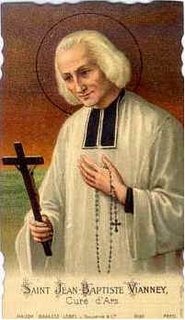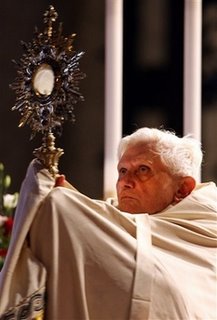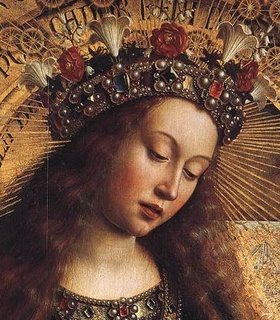
Sin is the executioner of the good God, and the assassin of the soul. It snatches us away from Heaven to precipitate us into Hell. And we love it! What folly! If we thought seriously about it, we should have such a lively horror of sin that we could not commit it. O my children, how ungrateful we are! The good God wishes to make us happy; that is very certain; He gave us His Law for no other end. The Law of God is great; it is broad. King David said that he found his delight in it, and that it was a treasure more precious to him than the greatest riches. He said also that he walked at large, because he had sought after the Commandments of the Lord. The good God wishes, then, to make us happy, and we do not wish to be so. We turn away from Him, and give ourselves to the devil! We fly from our Friend, and we seek after our murderer! We commit sin; we plunge ourselves into the mire. Once sunk in this mire, we know not how to get out. If our fortune were in the case, we should soon find out how to get out of the difficulty; but because it only concerns our soul, we stay where we are.
We come to confession quite preoccupied with the shame that we shall feel. We accuse ourselves by steam. It is said that many confess, and few are converted. I believe it is so, my children, because few confess with tears of repentance. See, the misfortune is, that people do not reflect. If one said to those who work on Sundays, to a young person who had been dancing for two or three hours, to a man coming out of an alehouse drunk, "What have you been doing? You have been crucifying Our Lord!" they would be quite astonished, because they do not think of it. My children, if we thought of it, we should be seized with horror; it would be impossible for us to do evil. For what has the good God done to us that we should grieve Him thus, and put Him to death afresh -- Him, who has redeemed us from Hell? It would be well if all sinners, when they are going to their guilty pleasures, could, like Saint Peter, meet Our Lord on the way, who would say to them, "I am going to that place where thou art going thyself, to be there crucified afresh. " Perhaps that might make them reflect.
The saints understood how great an outrage sin is against God. Some of them passed their lives in weeping for their sins. Saint Peter wept all his life; he was still weeping at his death. Saint Bernard used to say, "Lord! Lord! it is I who fastened Thee to the Cross!" By sin we despise the good God, we crucify the good God! What a pity it is to lose our souls, which have cost Our Lord so many sufferings! What harm has Our Lord done us, that we should treat Him so? If the poor lost souls could come back to the earth! if they were in our place! Oh, how senseless we are! the good God calls us to Him, and we fly from Him! He wishes to make us happy, and we will not have His happiness. He commands us to love Him, and we five our hearts to the devil. We employ in ruining ourselves the time He fives us to save our souls. We make war upon Him with the means He gave us to serve Him.
When we offend the good God, if we were to look at our crucifix, we should hear Our Lord saying to us in the depths of our soul, "Wilt thou too, then, take the side of My enemies? Wilt thou crucify Me afresh?" Cast your eyes on Our Lord fastened to the Cross, and say to yourself, "That is what it cost my Saviour to repair the injury my sins have done to God!" A God coming down to earth to be the victim of our sins, a God suffering, a God dying, a God enduring every torment, because He would bear the weight of our crimes! At the sight of the Cross, let us understand the malice of sin, and the hatred we ought to feel for it. Let us enter into ourselves; let us see what we can do to make amends for our poor life.
"What a pity it is!" the good God will say to us at our death; "why hast thou offended Me -Me, who loved thee so much?" To offend the good God, who has never done us anything but good; to please the devil, who can never do us anything but evil! What folly! Is it not real folly to choose to make ourselves worthy of Hell by attaching ourselves to the devil. when we might taste the joys of Heaven, even in this life, by uniting ourselves to God by love? One cannot understand this folly; it cannot be enough lamented. Poor sinners seem as if they could not wait for the sentence which will condemn them to the society of the devils; they condemn themselves to it. There is a sort of foretaste in this life of Paradise, of Hell, and of Purgatory. Purgatory is in those souls that are not dead to themselves; Hell is in the heart of the impious; Paradise in that of the perfect, who are closely united to Our Lord.
He who lives in sin takes up the habits and the appearance of the beasts. The beast, which has not reason, knows nothing but its appetites. So the man who makes himself like the beasts loses his reason, and lets himself be guided by the inclinations of his body. He takes his pleasure in good eating and drinking, and in enjoying the vanities of the world, which pass away like the wind. I pity the poor wretches who run after that wind; they gain very little, they five a great deal for very little profit -- they five their eternity for the miserable smoke of the world.
My children, how sad it is! when a soul is in a state of sin, it may die in that state; and even now, whatever it can do is without merit before God. That is the reason why the devil is so pleased when a soul is in sin, and perseveres in it, because he thinks that it is working for him, and if it were to die he would have possession of it. When we are in sin, our soul is all diseased, all rotten; it is pitiful. The thought that the good God sees it ought to make it enter into itself. And then, what pleasure is there in sin? None at all. We have frightful dreams that the devil is carrying us away, that we are falling over precipices. Put yourself on good terms with God; have recourse to the Sacrament of Penance; you will sleep as quietly as an angel. You will be glad to waken in the night, to pray to God; you will have nothing but thanksgivings on your lips; you will rise I towards Heaven with great facility, as an eagle soars through the air.
See, my children, how sin degrades man; of an angel created to love God, it makes a demon who will curse Him for eternity. Ah! if Adam, our first father, had not sinned, and if we did not sin every day, how happy we should be! we should be as happy as the saints in Heaven. There would be no more unhappy people on the earth. Oh, how beautiful it would be! In fact, my children, it is sin that brings upon us all calamities, all scourges, war, famine, pestilence, earthquakes, fires, frost, hail, storms -- all that afflicts us, all that makes us miserable. See, my children, a person who is in a state of sin is always sad. Whatever he does, he is weary and disgusted with everything; while he who is at peace with God is always happy, always joyous. . . . Oh, beautiful life! Oh, beautiful death!
My children, we are afraid of death; I can well believe it. It is sin that makes us afraid of death; it is sin that renders death frightful, formidable; it is sin that terrifies the wicked at the hour of the fearful passage. Alas! O God! there is reason enough to be terrified, to think that one is accursed -- accursed of God! It makes one tremble. Accursed of God! and why? for what do men expose themselves to be accursed of God? For a blasphemy, for a bad thought, for a bottle of wine, for two minutes of pleasure! For two minutes of pleasure to lose God, one's soul, Heaven forever! We shall see going up to Heaven, in body and soul, that father, that mother, that sister, that neighbour, who were here with us, with whom we have lived, but whom we have not imitated; while we shall go down body and soul to burn in Hell. The devils will rush to overwhelm us. All the devils whose advice we followed will come to torment us.
My children, if you saw a man prepare a great pile of wood, heaping up fagots one upon another, and when you asked him what he was doing, he were to answer you, "I am preparing the fire that is to burn me, " what would you think? And if you saw this same man set fire to the pile, and when it was lighted throw himself upon it, what would you say? This is what we do when we commit sin. It is not God who casts us into Hell; we cast ourselves into it by our sins. The lost souls will say, "I have lost God, my soul, and Heaven; it is through my fault, through my fault, through my most grievous fault!" He will raise himself out of the fire only to fall back into it. He will always feel the desire of rising because he was created for God, the greatest, the highest of beings, the Most High . . . as a bird shut up in a room flies to the ceiling, and falls down again, the justice of God is the ceiling which keeps down the lost.
There is no need to prove the existence of Hell. Our Lord Himself speaks of it, when He relates the history of the wicked rich man who cried out, "Lazarus! Lazarus!" We know very well that there is a Hell, but we live as if there were not; we sell our souls for a few pieces of money. We put off our conversion till the hour of death; but who can assure us that we shall have time or strength at that formidable moment, which has been feared by all the saints -- when Hell will gather itself up for a last assault upon us, seeing that it is the decisive moment? There are many people who lose the faith, and never see Hell till they enter it. The Sacraments are administered to them; but ask them if they have committed such a sin, and they will answer you, "Oh! settle that as you please. "
Some people offend the good God every moment; their heart is an anthill of sins: it is like a spoilt piece of meat, half-eaten by worms. . . . No, indeed; if sinners were to think of eternity -- of that terrible forever -- they would be converted instantly.
Read more on
St. John Vianney

















